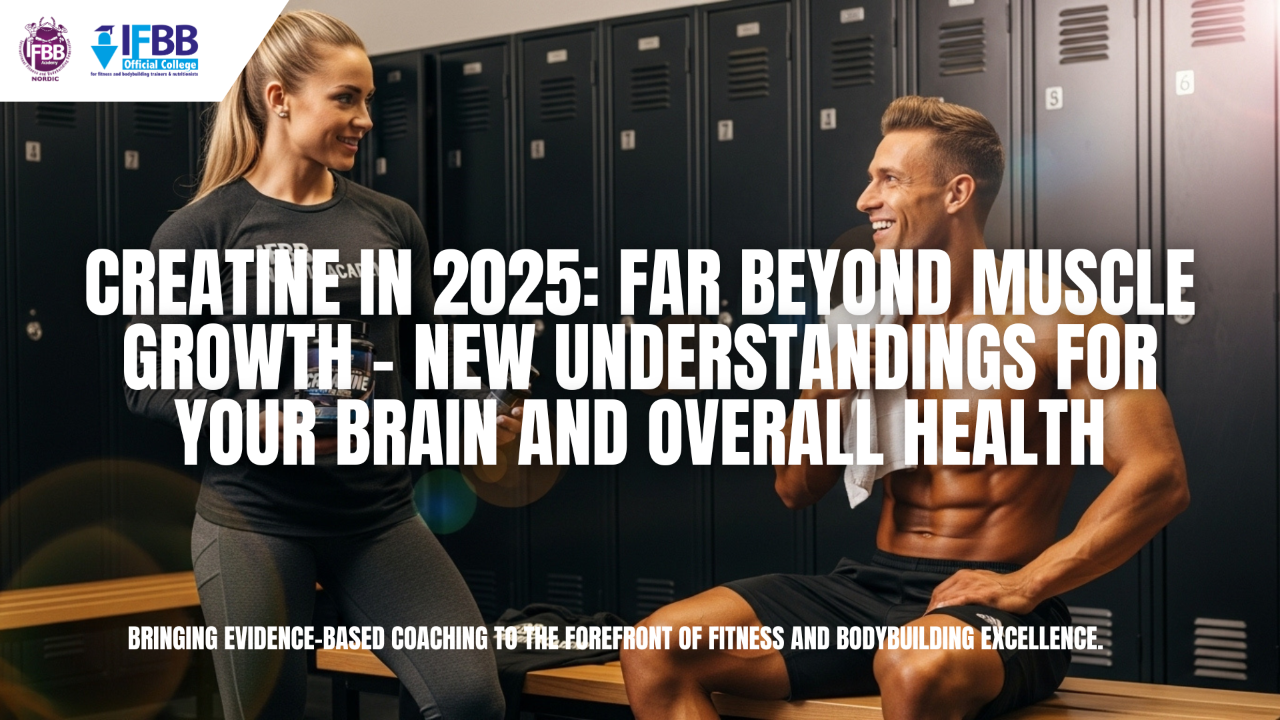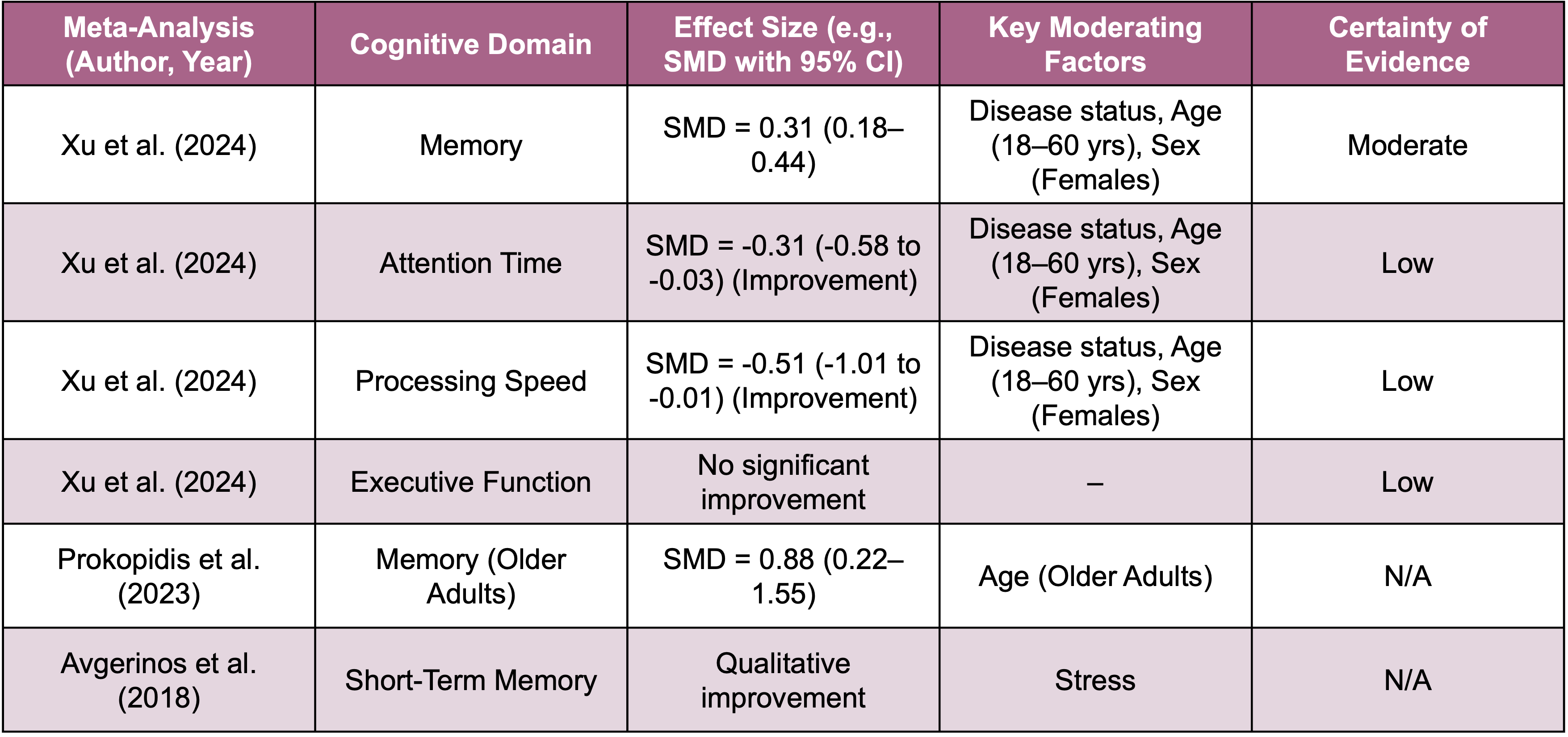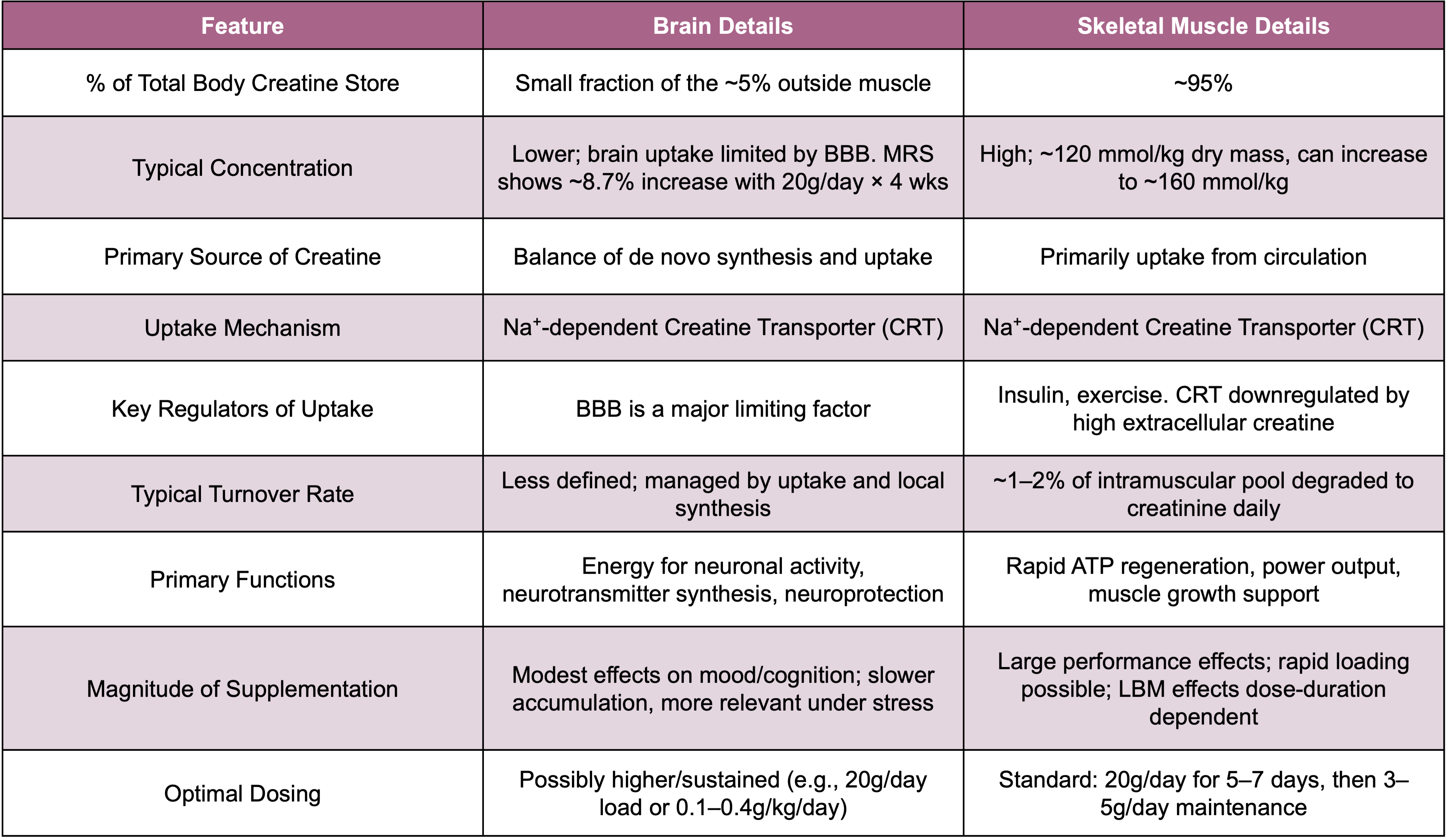Creatine in 2025: Far Beyond Muscle Growth – New Understandings for Your Brain and Overall Health
Jun 04, 2025
This article is also available in:
Creatine monohydrate is well-known in fitness circles for its ability to support muscle performance, strength, and hypertrophy. This reputation is built on extensive scientific research and acknowledged by leading sports nutrition bodies. Traditionally, creatine has been viewed mainly through the lens of athletic improvement and muscle physiology. However, by 2025, scientific understanding has broadened considerably. Research now highlights creatine's significant physiological importance in all tissues with high and fluctuating energy demands, particularly the brain. While its effects on skeletal muscle are undeniable, the exploration of creatine's neurological and broader systemic benefits represents a rapidly advancing frontier in nutritional science.
This article provides a synthesis of the current understanding in 2025 regarding the multifaceted effects of creatine supplementation, extending beyond its established role in muscle. We will look at the evidence for creatine's influence on mood, various aspects of cognitive function, and other potential health benefits, based on recent scientific reviews and research.
Creatine is a naturally occurring compound, primarily synthesized in your liver, kidneys, and pancreas. Approximately 95% of it is stored in your skeletal muscle as phosphocreatine (PCr). You also obtain creatine through your diet, mainly from red meat and fish. Its primary role is to support rapid ATP regeneration, which is energy production for short-duration, high-intensity activities. Your ATP-PCr system is fundamental for power and strength output.
Your Brain's High Energy Needs and Creatine's Role
Your brain accounts for about 2% of your body mass yet consumes approximately 20% of your body's total energy at rest. This high metabolic rate is constant, indicating a continuous need for efficient energy production. Creatine, through the phosphocreatine (PCr) system, plays an indispensable part in meeting these demands. It acts as an energy buffer, facilitating the rapid regeneration of adenosine triphosphate (ATP), your cells' primary energy currency. This fundamental function provides a strong rationale for investigating creatine's benefits for brain health.
The body synthesizes creatine, mainly in the liver, kidneys, and pancreas. However, during heightened physiological stress, increased metabolic demand, or in populations with lower baseline levels, this internal synthesis might not be enough to maintain optimal tissue concentrations, especially in the brain. This has led to the concept of creatine as a "conditionally essential" nutrient for brain health. If your brain's intrinsic supply cannot meet its energy needs, particularly during challenging situations like sleep deprivation or aging where cognitive benefits of creatine are most apparent, supplementation might help restore or optimize brain energy balance.
Creatine's Influence on Mood
Emerging evidence in 2025 suggests that creatine supplementation can positively affect mood and may serve as a useful adjunctive treatment for various affective disorders. Its role seems linked to its capacity to modulate brain bioenergetics, which are often disrupted in these conditions.
- Adjunctive Treatment for Major Depressive Disorder (MDD): Recent clinical investigations indicate creatine's potential in augmenting standard treatments for MDD. A 2025 study by Sherpa et al. showed that when creatine was added to Cognitive Behavioral Therapy (CBT), participants had a significantly greater improvement in depressive symptoms compared to CBT with a placebo. Earlier research, such as Lyoo et al. (2012), found that creatine supplementation (5 g/day) accelerated the antidepressant response to selective serotonin reuptake inhibitors (SSRIs) in women with MDD. The basis for these effects is increasingly understood; depression has been linked to impaired brain energy metabolism, and creatine helps by increasing brain phosphocreatine levels, thereby supporting ATP regeneration.
- Effects on Bipolar Depression: The use of creatine in bipolar depression has shown mixed results. A trial by Toniolo et al. (2017) using 6 g/day of creatine did not find significant mood improvements but did note an improvement in verbal fluency. A significant caution is that creatine supplementation has been associated with the potential to induce manic or hypomanic episodes in individuals with bipolar disorder. Its use in this population requires careful clinical consideration and monitoring.
- Impact on Post-Traumatic Stress Disorder (PTSD) and Anxiety: Preliminary research suggests creatine may hold promise for PTSD and anxiety. Open-label trials have indicated that creatine supplementation can lead to reductions in PTSD symptoms and comorbid depressive symptoms. For example, Amital et al. (2006a) found that creatine (3-5 g/day) added to ongoing psychiatric treatment led to a statistically significant decrease in PTSD symptom scores. While dedicated studies on anxiety are less common, some research has reported modest benefits for anxiety symptoms as a secondary outcome.
- Sleep and Mood in Women: One study demonstrated an increased total sleep duration among naturally menstruating females on days they performed resistance training while supplementing with creatine, compared to non-resistance training days. The underlying mechanism may involve enhanced brain energy metabolism, which could promote longer sleep cycles. Creatine supplementation has indicated positive effects on mood and cognitive function, potentially alleviating symptoms of depression , and might improve mood by supporting sleep regulation.
Mechanisms of Mood Modulation: The primary way creatine is thought to affect mood is by improving brain bioenergetics. By increasing brain phosphocreatine, it supports a more robust ATP supply, which is important for neuronal function, especially under stress. Creatine may also offer neuroprotective effects and influence neurotransmitter systems like serotonin and dopamine. Current strong evidence primarily supports creatine's role as an adjunctive treatment.
Practical Applications: Sleep & Mood
- Recognize Sleep Importance: If you experience sleep disturbances, particularly those you feel are linked to your training, creatine (when combined with resistance training) might offer some support.
- Enhance Recovery: Improved sleep quality can significantly enhance your recovery, mood, and overall well-being.
- Monitor Cognitive Benefits: Pay attention to whether creatine supplementation coincides with any improvements in your mood or cognitive function.
- Coaching Approach: You should always discuss sleep hygiene with athletes. Resistance training positively influences sleep; creatine may augment these benefits. For athletes who report mood disturbances (always refer to a qualified healthcare professional), creatine may be a supportive nutritional strategy to consider.
Table 1: Summary of Key Clinical Trials on Creatine Supplementation for Mood Disorders (as of 2025)

Creatine for Cognitive Power: What the Research Says
Creatine's role in improving cognitive functions has been studied extensively, revealing a complex but increasingly clear picture by 2025.
-
Memory Function: Multiple systematic reviews and meta-analyses indicate that creatine supplementation can improve certain aspects of memory.
- Avgerinos et al. (2018) found evidence suggesting short-term memory and reasoning may be supported by creatine, especially under stress.
- Prokopidis et al. (2023) highlighted significant memory support in older adults (Standardized Mean Difference, SMD = 0.88).
- A comprehensive meta-analysis by Xu et al. (2024, with a 2025 corrigendum) reported modest but statistically significant improvements in memory function in adults (SMD = 0.31). Benefits appeared more pronounced in individuals with existing diseases, those aged 18-60 years, and in females. Working memory and visuospatial short-term memory seem to benefit.
-
Executive Functions, Attention, and Processing Speed:
- Executive Function: Evidence for broad improvements here is largely inconclusive. Xu et al. (2024) did not find significant improvements.
- Attention: Xu et al. (2024) found creatine led to improvements in attention time (SMD = -0.31), with low certainty of evidence.
- Processing Speed: Xu et al. (2024) reported statistically significant improvements in processing speed (SMD = -0.51), also with low certainty.
- A key observation is that creatine's cognitive benefits often become most apparent when the brain is under "cognitive stress," such as sleep deprivation, aging, or high task complexity.
-
Short-Term vs. Long-Term Cognitive Effects:
- Acute Effects: Recent research challenges the view that benefits are only long-term. Gordji-Nejad et al. (2024) showed a single high dose of creatine (0.35 g/kg body weight) could improve working memory and processing speed and buffer brain energy decline during partial sleep deprivation.
- Chronic Effects: Most studies involve supplementation for weeks to months. Standard protocols often include a loading phase (e.g., 20 g/day for 5-7 days) then maintenance (3-5 g/day). Such regimens can increase brain creatine levels (e.g., by an average of 8.7% after four weeks of 20 g/day).
Table 2: Meta-Analytic Findings on Creatine and Cognitive Outcomes in Adults (as of 2025) (Based on the provided source document's synthesis)

How Creatine Works in Your Brain
Creatine's benefits for mood and cognition primarily stem from its ability to support brain bioenergetics, with other mechanisms also contributing.
- Support for Brain Bioenergetics: Creatine supplementation increases brain phosphocreatine (PCr) and total creatine levels. Magnetic Resonance Spectroscopy (MRS) studies have shown an average increase of about 8.7% in total brain creatine after four weeks of 20 g/day. PCr donates its phosphate group to adenosine diphosphate (ADP) to rapidly regenerate ATP, maintaining the energy supply for neuronal processes.
- Neuroprotective Properties: Creatine has antioxidant capabilities. For instance, in patients with Huntington's disease, creatine (8 g/day) decreased a biomarker of oxidative DNA damage. It may also improve cellular resilience against stressors.
- Modulation of Neurotransmitter Systems: Emerging evidence suggests creatine can influence serotonin and dopamine systems, which are involved in mood, motivation, and cognition.
- Other Potential Mechanisms: Creatine plays a role in intracellular buffering and might affect gene expression related to cellular responses to inflammation.
The blood-brain barrier (BBB) limits creatine entry into the brain, making brain uptake "slow and limited" compared to skeletal muscle. This has implications for dosing.
What Influences Creatine's Effects on Your Brain?
Several factors can moderate creatine's impact on brain health.
- Age:
- Older Adults (60+): Often show more pronounced cognitive benefits, especially in memory. This may be due to lower baseline brain creatine or age-related declines in its synthesis.
- Younger Adults (18-60): Can also benefit, particularly under metabolic stressors like sleep deprivation.
- Pediatric Populations: Creatine is important for normal growth and energy metabolism. Supplementation has shown benefits in specific pediatric disorders.
- Sex:
- Females: May experience more cognitive benefits, possibly due to typically lower baseline intramuscular creatine stores (70-80% of men's) and lower endogenous synthesis rates. Creatine has also been reported to help with fatigue symptoms related to the menstrual cycle. However, sex-related differences in brain response to creatine require more research.
- Dietary Patterns (Vegetarianism/Veganism):
- Vegetarians and vegans generally have lower baseline creatine stores and may experience more pronounced improvements in physical and cognitive performance with supplementation.
- Metabolic Stress:
- Sleep Deprivation: Benefits are particularly evident here. High acute doses can help counteract cognitive impairments and sustain brain energy levels during sleep loss.
- High Cognitive Demand: Benefits are often more apparent during mentally demanding tasks.
- Disease States: Individuals with existing diseases may see more cognitive benefit.
Generally, individuals with lower initial creatine levels or those experiencing conditions that increase brain energy needs tend to derive the most significant benefits.
Creatine: Brain vs. Muscle – What's the Difference?
While creatine serves energy buffering in both brain and muscle, there are key differences:
Table 3: Comparative Overview of Creatine in Brain vs. Skeletal Muscle (as of 2025)

Beyond Muscle and Mind: Other Ways Creatine May Support Your Health
By 2025, research links creatine to other potential health benefits:
- Neurodegenerative Diseases:
- Potential for neuroprotection in conditions like Parkinson's and Huntington's disease (e.g., decreased oxidative DNA damage marker in Huntington's). Evidence for clinical benefit in Parkinson's is not yet strong. Effects might be most relevant in early stages.
- More consistent benefits in muscular dystrophies (increased muscle strength).
- Found ineffective for ALS.
- Traumatic Brain Injury (TBI) and Concussion Recovery: Shows promise in aiding recovery by promoting brain energy metabolism and reducing neuronal damage, especially in children.
- Chronic Fatigue Syndrome (CFS): May help by supporting overall energy metabolism.
- Cardiovascular Health: Emerging evidence suggests potential benefits, possibly improving exercise capacity in certain conditions and offering antioxidant properties.
- Bone Health: May counteract some bone changes associated with menopause (with resistance exercise) and correlates with bone mineral content in children.
- Immune Health: Some indications of support for immune function, requiring more study.
- Pediatric Health and Development: Important for growth, maturation, and body composition. Benefits seen in specific pediatric disorders.
Using Creatine Safely and Effectively in 2025
- Overall Safety Profile: Creatine monohydrate is widely recognized as safe. Long-term use (up to 30 g/day for 5 years) is generally well-tolerated. No robust scientific evidence supports myths of kidney damage in healthy individuals. Minor side effects like gastrointestinal upset are infrequent. It is not an anabolic steroid.
- Dosing Considerations for Brain and Non-Muscular Benefits:
- Achieving significant increases in brain creatine may require higher doses (e.g., loading at 20 g/day or 0.3-0.4 g/kg body weight) or longer-term supplementation (e.g., 0.1-0.14 g/kg/day) than for muscle.
- Acute high doses (e.g., 0.35 g/kg body weight) have shown efficacy for immediate cognitive support under stress like sleep deprivation.
- A standard maintenance dose is 3-5 grams per day. The optimal dose for sustained cognitive or mood benefits might be higher for some.
- Knowledge Gaps and Future Research:
- Long-term cognitive effects beyond five years.
- Optimal dosing protocols for specific brain benefits.
- Precise molecular mechanisms for cognitive/mood effects.
- Sex- and age-specific responses.
- Creatine with other therapies.
- Impact of different creatine forms on brain uptake.
- Individualized supplementation strategies.
Conclusion: Creatine in 2025 – A Versatile Ally for Your Health
By 2025, creatine is understood as a multifaceted molecule with significant implications far beyond muscle . It shows considerable promise for supporting mood, specific cognitive functions (especially memory and processing speed under stress or in older adults), and a range of other physiological processes .
For women, research over the last two decades, with recent studies improving designs to account for the menstrual cycle and female sex hormones, supports positive effects on muscle strength, exercise performance, and body composition (particularly with resistance training) . Additionally, creatine may offer cognitive and mood benefits . Cellular hydration is another area where creatine shows promise for women . While effects may vary with hormonal fluctuations and life stages, the overall risk-to-benefit ratio appears favorable .
Its primary action lies in supporting cellular energy metabolism, which is fundamental for high-demand tissues like your brain. Creatine's efficacy is influenced by age, sex, diet, and metabolic stress. While its impact on the brain is generally more subtle than on muscle, the implications for neurological health and resilience are substantial.
Creatine monohydrate is a safe and versatile nutritional supplement. Its ability to bolster brain function offers a non-pharmacological approach to support mood, cognitive resilience, and recovery from neurological challenges. As research continues, particularly in areas like pregnancy and perimenopause , our understanding of creatine's full potential for health and wellness will undoubtedly grow.
IFBB Nordic Academy is committed to disseminating evidence-based health and fitness education to help you achieve optimal health and performance.
Ready to take your coaching skills to the elite level? Join the IFBB Master Coach Program and gain the knowledge, techniques, and confidence to coach athletes to success. Don’t miss this chance to learn from world-renowned experts and earn a globally recognized certification! Enroll today and unlock your full potential as a Master Coach.
Stay connected with news and updates!
Join our mailing list to receive the latest news and updates from our team.
Don't worry, your information will not be shared.
We hate SPAM. We will never sell your information, for any reason.
